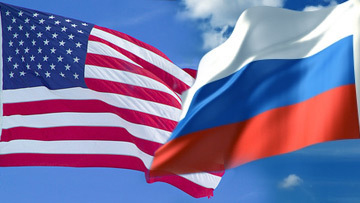The United States and Russia announced plans for a 'cessation of hostilities' in Syria that would take effect on Saturday but exclude groups such as Islamic State and al Qaeda's Nusra Front, a flaw immediately highlighted by Syrian rebels, Reuters reported.
Monday's agreement, described by a U.N. spokesman as "a first step toward a more durable ceasefire", is the fruit of intensive diplomacy between Washington and Moscow, which back opposing sides in the five-year-old civil war that has killed more than a quarter of a million people.
Presidents Barack Obama and Vladimir Putin discussed the accord by phone, and the Kremlin leader said it could "radically transform the crisis situation in Syria". The White House said it could help advance talks on bringing about political change in Syria.
To succeed, the deal will require both countries to persuade their allies on the ground to comply. And it leaves a significant loophole by allowing continued attacks, including air strikes, against Islamic State, Nusra and other militant groups.
Bashar al-Zoubi, head of the political office of the Yarmouk Army, part of the rebel Free Syrian Army, said this would provide cover for President Bashar al-Assad and his Russian allies to continue to attack opposition-held territory where rebel and militant factions are tightly packed.
"Russia and the regime will target the areas of the revolutionaries on the pretext of the Nusra Front's presence, and you know how mixed those areas are, and if this happens, the truce will collapse," he said.
Since intervening with air strikes in support of Assad in September, Russia has helped pave the way for significant advances by government forces in a conflict that has sucked in a host of world and regional powers.
The Syrian army is backed by Moscow, Iran and fighters from Lebanon's Hezbollah; ranged against them are rebels supported by the United States, Turkey and Saudi Arabia.
A joint US-Russian statement said the two countries and others would work together to delineate the territory held by Islamic State, Nusra Front and the other militant groups excluded from the truce.
But rebel officials said it was impossible to pinpoint positions held by Nusra Front.
"For us, al-Nusra is a problematic point, because al-Nusra is not only present in Idlib, but also in Aleppo, in Damascus and in the south. The critical issue here is that civilians or the Free Syrian Army could be targeted under the pretext of targeting al-Nusra," said a senior opposition figure, Khaled Khoja.
He said the cessation would be for an initial two weeks and "could be extended indefinitely if the parties commit to it."
In a separate development, Assad called a parliamentary election for April 13. The timing was not a surprise, as elections are held every four years and the last one was in 2012.
TALKS "VERY SOON"
U.N. chief Ban Ki-moon welcomed the US-Russian announcement, which follows a failed attempt by his Syria envoy Staffan de Mistura last month to restart peace talks in Geneva.
"The Secretary-General strongly urges the parties to abide by the terms of the agreement," Ban's spokesman Stephane Dujarric said. "Much work now lies ahead to ensure its implementation."
De Mistura told Reuters the cessation accord could allow a resumption of negotiations. "We can now relaunch very soon the political process which is needed to end this conflict," he said.
U.N. Deputy Secretary-General Jan Eliasson told Reuters he was "not pessimistic".
"There has to be a de-escalation, that we need to make sure that we go in the direction of the talks. That means that any military activity should now be reduced," he said.
Under the terms of the cessation, parties would indicate their agreement to the United States and Russia by noon on Friday Damascus time (1000 GMT), and the truce would go into effect at midnight, the two countries said.
Syrian government and allied forces will cease attacks against armed opposition forces, and vice versa, with any weapons including rockets, mortars, anti-tank guided missiles.
US Secretary of State John Kerry said there were "significant challenges ahead" but urged all parties to accept the terms of the deal.
"If implemented and adhered to, this cessation will not only lead to a decline in violence, but also continue to expand the delivery of urgently needed humanitarian supplies to besieged areas and support a political transition to a government that is responsive to the desires of the Syrian people," he said in a statement.
Israeli Defence Minister Moshe Yaalon, in a speech aboard a US navy ship visiting Israel as part of a joint military drill, said: "It is difficult to see a stable ceasefire in actuality, with all players agreeing to it ... I cannot see a comprehensive ceasefire on the horizon."
The Syrian Observatory for Human Rights, a British-based monitoring group, said fighting and air strikes continue unabated across Syria on Monday.
Islamic State attacked the Syrian government's main supply route from Damascus to the northern city of Aleppo, a day after the group targeted Damascus and Homs in some of the bloodiest car bomb attacks of the war.
A U.N.-backed panel said war crimes were widespread, and Syrian government forces and Islamic State militants continued to commit crimes against humanity in the face of inaction by the international community.
"Flagrant violations of human rights and international humanitarian law continue unabated, aggravated by blatant impunity," the U.N. Independent International Commission of Inquiry said in its latest report.






